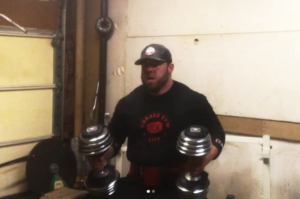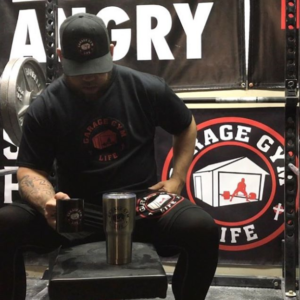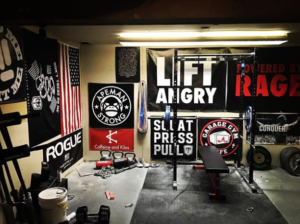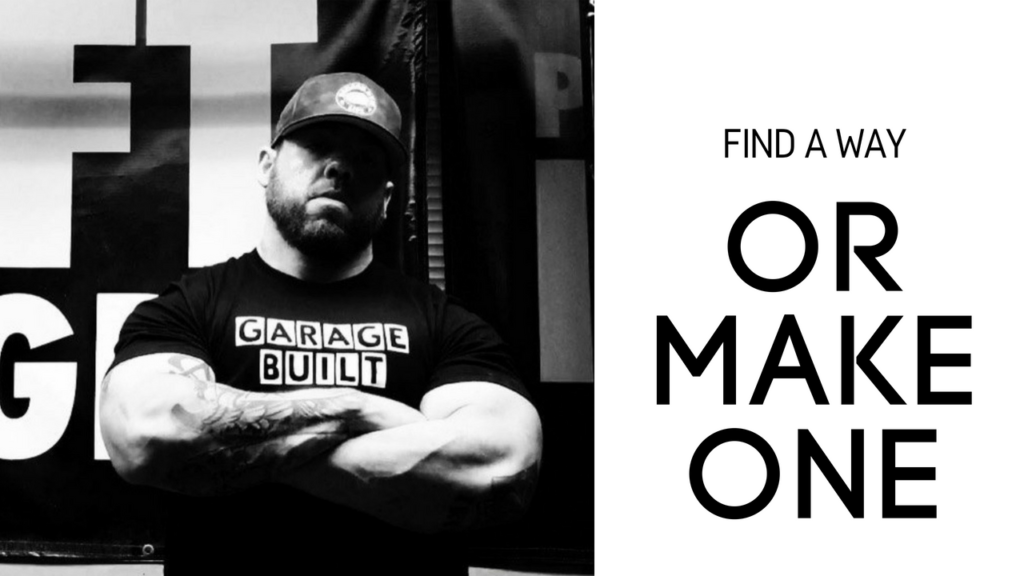The Origin of DeadliftPro6
Wes Jenkins or deadliftpro6 as he’s known on Instagram is a guy who just seems to get stronger by the day. Not given to flashy training methods, every visit to his IG account yields footage of no frills barbell and dumbbell training in a garage gym decorated only with a Lift Angry poster and one of Arnold Schwarzenegger urging you to conquer. Were he to train in a commercial gym, Wes would be that guy who hardly speaks to anyone; just comes in with headphones on to put in work and leave. Wes is generous with his time on Instagram; patiently answering questions about training methods from anyone who asks. That more than anything else is why I decided we needed to have an in-depth conversation with this strong but humble garage athlete.
Wes, glad to have a conversation with you about your training. How long have you been exercising?
I’ve been exercising over half my life. I started weight lifting in Junior High School for football, and continued throughout high school, where lifting actually became more of a passion of mine than football.
Have you ever trained in a commercial gym?
Yes, I spent a few years training at a Gold’s Gym. It is a very nice facility, but I have always preferred putting in my headphones and training alone.
What led you to train at home?
I started at Gold’s when they first opened in 2003, but by 2006, the membership was so large, that an hour workout would take two hours plus. I have always had equipment at home, but at this point I really started investing in building my own setup.
What was in your first home gym?
The first piece of equipment was a standard 200 lb weight set and bench from Sears, I believe it was a Weider set. At that time, my father was lifting with me, so he went out and bought a 300 lb Olympic set.
What’s the origin of your Instagram handle?
My IG handle is deadliftpro6, the 6 is irrelevant—
I actually thought it was a play on words like, “Deadlift Pro cess?” Since you’re really methodical about your training. Thought you were being clever and now there’s no meaning at all? Thanks a lot Wes!
Ha! Ha! I might have to steal that idea now.
There you go because I’m just telling you flat out, that’s what it is! It’s the deadlift process! You’ve got no choice in the matter ha ha!
Ha ha! Sounds good! But I picked deadliftpro, because if I could pick one lift, that would be it. I’ve come fairly close to mastering my conventional form, and am currently perfecting my sumo form. I’ve helped a lot of people that I’ve trained on their deadlift, and enjoy every second of it. I guess from the years of studying the lift so much, trying to perfect my own form, it has made it easier to spot form or leverage issues when I watch someone else. Although there isn’t much that makes me happier than a new deadlift PR, it makes me equally happy, and honestly a bit proud, when I can help someone else hit a PR, or even something as simple as a small form check to make the lift more comfortable for them.
Ok so as far as you started with the basics but you’ve got more than that now. What was the first piece of equipment you bought when you started to expand?
After a few years of just bare bones training in the garage, I invested in a Yukon Fitness Incline/Flat Bench which was quite a bit more heavy duty than what I had used before. I think it was around $400, and at the time, I thought that would be the extent of it, except for maybe some dumbbells.
What’s your favorite piece of equipment now?
That is honestly a toss-up between my Rogue Deadlift Bar, and my Titan Fitness Power Rack. Squatting and deadlifting are my favorite lifts, so I could still enjoy every minute of training, if those were my only two pieces of equipment.
Tell me about something you’ve sold and wished you hadn’t. Mine is a set of 95lb dumbbells that my brother Boo gave me. I got rid of them because I needed to make room on my rack and I’ve been kicking myself ever since. I haven’t bought another set because I’ll have to hear his mouth. But I need them so I’ll probably have to suck it up.
Oh man, I was handed down a Buddy Capps Texas Squat Bar before I got serious about powerlifting, and a friend offered me $300 for it. I jumped on that thinking I could buy a few more pieces of equipment with the money. That was also before I realized how important the right bar is for each lift. Now though, I’m in need of a legit power bar for squatting, and don’t want to spend $500 on another one. Like you said though, I’ll probably have to eventually bite the bullet and do it!
What’s on your wishlist for equipment?
Aside from another Texas Squat Bar, I’d really like to get a Prowler. I remember pushing sleds in football, and how fast our conditioning improved. So that will probably be next.
Training and Nutrition
Back to the deadliftpro6, (ha see what I did there?), describe your training and nutrition philosophy.
My training philosophy is old school. Just shut up and do the work, don’t run from your weaknesses, embrace them, and annihilate them. Too many people just stick to a few lifts that are comfortable, and never see where they could be if the pushed the pain threshold. If squats are your worst lift, my first advice would be to do it twice as often. No one has any amazing stories about the gains they made, or a lifetime PR they hit, by taking it easy, and skipping the stuff that seems more like work than fun. Nutritionally, it’s pretty simple. I aim for 1g of protein per pound of bodyweight, and carb cycle which is dependent on the training day. I’ll shift my protein up to 1.25-1.5g of protein per pound on non-training days, since I try to hold my carbs under 50 those days. On heavy Squat and Deadlift days, I keep the carbs between 4-500g, and will adjust accordingly if I’m trying to cut weight. Bench Days are moderate days -200-250g right now, since for a majority of the workout, your body is stationary, so you don’t need the same fuel that you would on full body days. I believe in long slow cuts, a pound or two a week at most. Keeping the carbs cycling, allows your body enough fuel to recover and continue to get stronger on the heavy days, and the low carb days are when the weight comes off. So right now carb wise a week would go 250/50/500/250/50/500/50.
 I love your quote from Hannibal, “We will find a way, or make one,” how does that apply to your life and your approach to things you encounter when training at home alone?
I love your quote from Hannibal, “We will find a way, or make one,” how does that apply to your life and your approach to things you encounter when training at home alone?
Well to be clear to anyone who isn’t interested in history, I’m not talking about Hannibal Lecter ha ha! Hannibal is known as one of the greatest military commanders in history, as he was a general in the Carthaginian Army. Their military force was massive, and they traveled in the thousands, but they outfitted elephants with armor as part of their force. Other generals and commanders deemed it impossible to cross the Alps with that many men, and all of the elephants in tow. That quote was his response. He was ready to level mountains to achieve his goal. That applies to a lot of things in life. Anything that you are passionate about, or any goal that you have set your heart on, should be undertaken with a similar mentality. I think it applies tremendously to training, in the sense that, especially training alone, you have to set goals, and these goals however lofty they may be, are achievable. There will always be those who tell you no, it’s never going to happen, or you’re too old or too small, and that’s when you have to say to yourself, “This is what I want to achieve, your way may not work for me, Arnold’s way may not work for me, Mark Bell’s way may not work for me, but I will make it happen, my way, no matter what it takes.”
Hannibal ultimately failed in his quest but he’s much more famous that thousands of other generals who succeeded. Would you rather fail gloriously than succeed quietly a la Theodore Roosevelt?
Honestly, yes, I would rather fail, but continue to inspire people to give it their all. Gen. Patton is another one, although he didn’t lose any campaigns, his words and his mentality are what he is most remembered for. Think of King Leonidas as well, he ultimately failed, but in failure, he proved to be one of the toughest men alive. And that inspired his countrymen for generations.
You’ve been leaning out recently, why did you decide to do that around holiday time when most people just go on bulking phases since there’s so much temptation around? Is that another case of finding a way or making one?
Exactly, I am guilty in the past of putting on 5-10 pounds over the holiday season, and once January is here, you have a month of cardio waiting, and I don’t think cakes and pies are worth throwing me that far off course. I love to eat, but I can stay pretty bare bones with it and be content. I also like a challenge, I’m at 216 lbs right now, and would like to be at 212-213 by New Year’s Day.
Do you do mobility work?
Yes I do, that has helped my squat depth more than anything. It also has given me more confidence to get back to going 100% after my hamstring tear. Regardless of your program, if you replaced 3 or 4 sets of weight training with 10-15 minutes of mobility work, you would be amazed. You wouldn’t start a cold engine and then floor it, so don’t do the same to your body!
Tell me your overall thoughts about the Bill Starr rehab protocol. It’s a little unusual but it seems to have helped you recover from injuries pretty quickly.
Yes, it does kind of go against the grain of what most therapists/physiologists would recommend. But the amount of athletes that have used it, and swore by it is what got me interested. What it boils down to, is any muscular injury that is in the belly of the muscle, a strain, pull, tear, etc., can be rehabbed by training it directly. This keeps scar tissue from developing around the injury, because you are still doing direct exercises, and in turn the muscle will heal while maintaining the correct neural pattern which keeps the muscle contracting normally. That combined with the influx of blood in the area from the very high rep sets, carries more vitamins and proteins to the area. The more time the area is flushed with blood, the faster the healing process. Again this is for muscle injuries, not injuries that occur at the joint, or connective tissue. Recovery time is quoted at 2 weeks. I felt ready after a week to start going heavier, but stayed the course and PR’d on my first heavy sumo and squat day back.
Training Goals
 Let’s talk goals. You train as a powerlifter. Do you compete in powerlifting?
Let’s talk goals. You train as a powerlifter. Do you compete in powerlifting?
No, I don’t currently. I am a member of the USPA, and am hoping to do a meet in the late winter, early spring. Hopefully I’ll have my numbers around 520/365/600 by then.
What are your best numbers so far? You recently hit a 600lb sumo deadlift which was a goal when we first spoke. So that was huge!
Well, since I have yet to compete, my best gym numbers are:
345 paused bench press, 355 touch and go bench press.
560 Conventional Deadlift, and 600 Sumo.
Highest squat was 485 in sleeves, and 530 in wraps. Not a fan of wraps though. Rep PR’s on deadlift are 365×20 sumo and 315×26 Conventional
What’s your ideal weight; where do you plan to compete?
My ideal weight for the longest time was right around 200 pounds, which would keep me within a week or two cut of the 198 class. Right now though, I’m leaner than I have been in a long time at 215-220, depending on water intake. So 220 at my current bodyfat or lower would be ideal to hit over the next year.
You want to compete in 2017 in late winter, early spring, hopefully going over 500 in squat and at least 600 in deadlift. What are your strength goals over the next five years?
In 2017, I want to pull 650, squat 550, and bench 400. A 1,600 total.
Not looking any further than that? Okay, eyes on the prey, not the horizon. I get that. So how are you balancing out your desire to look good and to put up bigger numbers?
It comes mostly down to diet. With my job, I get a lunch break at 10am, and usually have greek yogurt, tuna, and two peanut butter sandwiches on Ezekiel bread, but other than that I drink 2 protein shakes at work. I get up at 3 am, and don’t get my first legitimate sit down meal at home until about 3:30 or 4. By that time though, I’ve hit my protein requirement except for post workout, and that makes it easier to monitor my carbs throughout the evening to control my weight. I don’t want to just be a big strong ox, there is nothing wrong with that, but I want to be athletic, be able to run, get rim on a regulation BB hoop, and still pull 600+.
Work/Life Balance
Being a mechanic can be exhausting. How do you make sure you’ve got the energy to train after playing around under a hood all day?
Actually that title throws a lot of people off. I’m actually a sheet metal fabricator, and installation mechanic for Kogok Corp., which is the biggest company of its type on the East Coast. It is a very demanding job physically. Since we start high rise buildings from the ground up, there are a lot of stairs to be tackled until a midpoint of the job when they have a service elevator. If we get a 20,000 pound truck full of metal for the fifth floor, it’s going up the stairs.
Do you train before work or after?
Although I’m dead somedays when I get home, especially waking up at 3am, it has never affected my training. No matter how hard the work day may be, training is my release, my therapy if you will.
 You have Apeman Strong’s Lift Angry poster in your power rack and you wear a number of their products when you train. Is putting that poster up and wearing the shirts a way for you to get psyched up to train?
You have Apeman Strong’s Lift Angry poster in your power rack and you wear a number of their products when you train. Is putting that poster up and wearing the shirts a way for you to get psyched up to train?
Yes, I remember before the brand got as big as it is now, I saw George Leeman wearing a Lift Angry shirt. I have always followed his training and being the former American deadlift record holder, I was obviously a fan of his training style. You can be as calm as a kitten any other part of the day, but when it comes time to train, aggression and intensity are key if you want big numbers. Be easy, but lift angry!
What advice do you have for someone just starting out in either exercise or who’s thinking about working out at home?
Find a buddy, be it a friend who trains, someone online, or even someone else who is just starting. Study and share knowledge, don’t be afraid to ask questions, or to fail. If you are serious about your health and well-being, you want to make it a lifelong venture. You don’t need to compete, or have the top of the line equipment. A pair of bands and some dumbbells is sufficient to make yourself better. The most important thing is do it for you. Train in the way that makes it enjoyable, it will go a long way in helping you stick with it!
Do you train people? I know you answer a ton of questions from people who follow you but do you do it professionally?
I am currently training two people. One of them will compete with me in the same weight class. I completed an ACE certification, but with that not being my profession, I don’t charge anyone. Ideally though, being a strength and powerlifting coach would be the job that I would enjoy waking up to everyday.
How can people contact you if they want to ask you questions about training or nutrition?
Feel free to shoot me a DM @deadliftpro6, or email me at wjenkins022@gmail.com, I would be glad to be of any assistance to anyone

